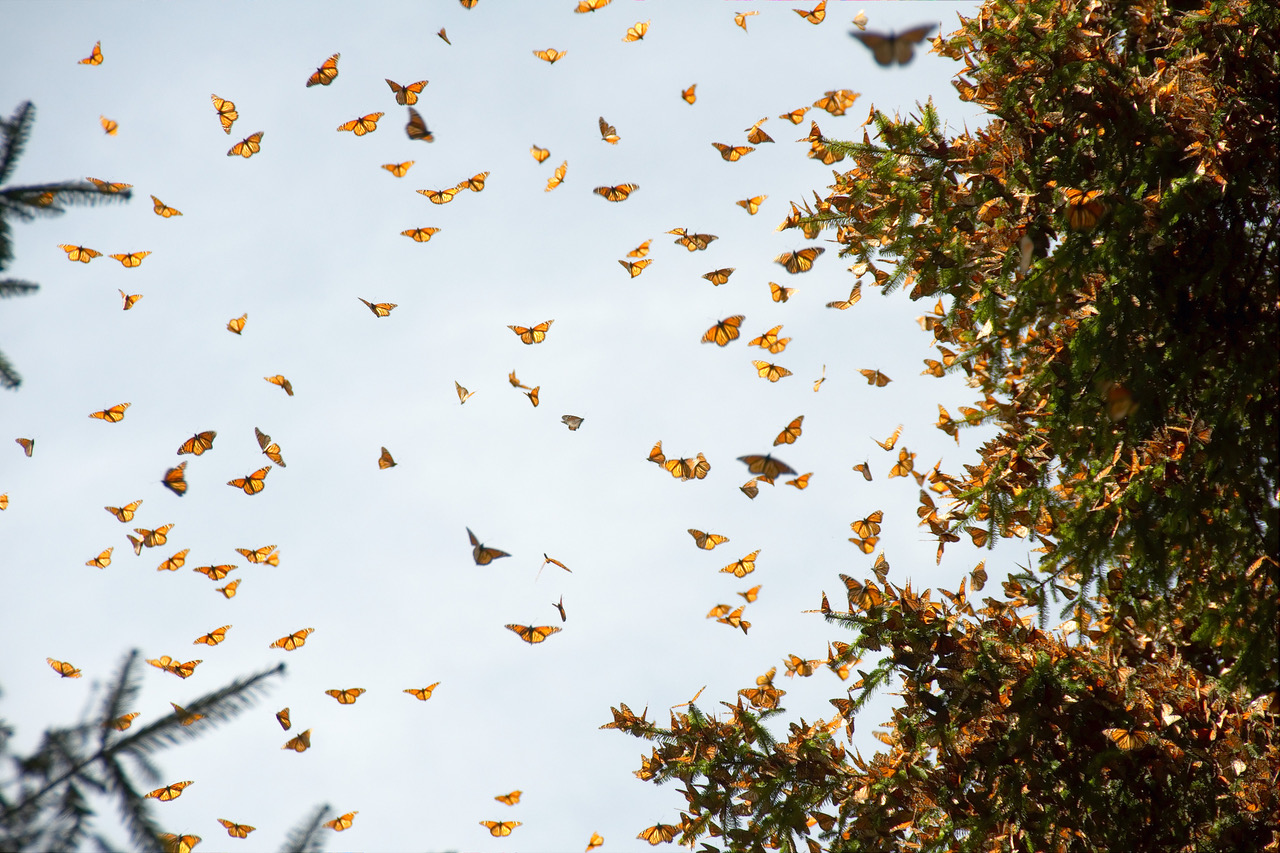When the Blessing Doesn’t Stay: the gift in the temporary
I moseyed through the screen door into my familiar backyard that late, slow summer afternoon. The door didn’t latch, but swung both ways, allowing me to slip out unnoticed until its screech sold me out to my younger brother who wasn’t far behind. By the age of twelve, I had gone through the door running from boredom so often, I would never have remembered this time. Except, in the middle of that ordinary day, the unbelievable happened.
At first I saw one, which surprised me.
Then I saw hundreds, maybe thousands more, and I was awestruck.
The trees were made of butterflies.
Majestic monarch butterflies had engulfed the tire-swing oak, the elm by the doghouse, the cottonwood leaning over the shed. On every tree, leaves and limbs were not visible, only vibrant orange, vivid gold, and velvet black. Massive clouds of delicate flighted creatures. It was an extravagant sight. Even a single butterfly would have been a gift on our prairie farm where a robin or squirrel seemed out of place.
My brother and I at first stood silently, heads tilted upward toward the soft hum of the fluttering tree clouds. I didn’t know how long our visitors would be staying. I didn’t know why they’d come. All I could take in at that moment was the grandeur of their arrival.
We steeped in a sight we had never seen before, and likely never would again. Mesmerized, our eyes fixed on the trees, we absorbed the encompassing glory.
And then, long before we were ready, the butterflies were gone.
SOME BLESSINGS ARE JUST FOR TODAY
No one will ever believe this. I’m not even sure I do.
For about two seconds into that magical invasion, I considered darting to my dresser drawer to dig for my Kodak Instamatic. Uncharacteristically, I stayed. And my brother took his cues from me. Somehow we both knew the butterfly blessing was meant to be transient.
I am hard-wired to record events, often at the expense of experiencing their wonder.
I’m glad I didn’t have a cell phone back then, or any camera within easy reach. Even a sixth-grade me would have focused on preserving the moment, and missed the blessing. As aware as I am of this tendency now, I have still missed living many moments because I was on the wrong side of a camera lens: my daughter’s first steps, my son’s Kindergarten play, the last glimpse of my mother’s smile.
So many blessings are only for today. They are perishable and designed to slip through our fingers. We can’t hold onto them too long, or they become worthless. We can’t keep them; we can only experience them. I keep re-learning this as chronic illness continues to challenge my faith. From my journal:
I often think back to the blessing of post-diagnosis normalcy. At first, I felt cheated that it happened at all, if it was only going to be temporary. My friend pointed out that God was saving my life by granting me access to a life-saving appendectomy. But He was also allowing me time to learn and share honestly about the ups and downs of any finite, faithful life. Time to strengthen my bond to Him. In my husband’s wise words, I am learning to trade what I can’t keep for something I can never lose.
The Israelites learned this, too. During their 40 years in the wilderness, they experienced a blessing they couldn’t keep: God rained down never-before-seen bread from heaven. If they grabbed too much manna it would spoil, or too little and they would go hungry for the day (Exodus 16:19-21).
More than establishing rules and exacting consequences, God’s love protects. The temporary nature of His blessings often guards us from what we don’t realize. For the Israelites, God released them from the burden of carrying manna around as they traipsed the wilderness. His blessing came to meet them, fresh every morning.
The temporary nature of His blessings often guards us from what we don’t realize.
Lori Ann Wood
It’s been a difficult, lifelong lesson for me: The impermanence of blessings is sometimes a gift.
Health, manna, or butterflies, I am learning to appreciate that some blessings can’t be held in a clenched fist, and that there is freedom in accepting their fleeting nature. But that small window of appreciation never diminishes the value.
THE SOURCE OF THE BLESSING MATTERS MOST
God’s children were instructed to keep a jar of manna, a remembrance of God’s care, as a way to teach those coming along behind (Exodus 16: 32-34).
As we finalized our parents’ estate recently, I had opportunity to reminisce with my little brother about the butterfly blessing. Though neither of us had spoken about the event since childhood, he remembers it much like I do. He, too, has reflected on it, and it has become part of our story, just as the manna became part of the Israelites’ inherited faith story. A jar of manna even ended up in the Ark of the Covenant (Hebrews 9:4).
The full-color memory of my monarch encounter has always pulled me into a sense of God’s majesty and care, even when the sky is black for a season, and answers are hard to come by.
I’m discovering that’s why sometimes the blessing itself isn’t permanent: The Hand that gives it, rather than the blessing, needs to be our focus.
Sometimes the blessing itself isn’t permanent; The Hand that gives it, rather than the blessing, needs to be our focus.
Lori AnN Wood
Just like us modern-day desert walkers, the Israelites were challenged to trust God, and even His instruction that some days would look different. They were told to gather twice as much to prepare for the Sabbath, when no manna would be provided (Exodus 16:22-30). So maybe the most difficult lesson—then and now—is, Do we trust Him that some days He’ll give us twice as much as we need to last until the next time He shows up?
God provided manna as a way to rely on Him fully and continually. The Israelites were likely a few days from starvation at any time. If the Israelites had a fresh grain supply nearby, they wouldn’t need God’s provision. With few options in the wilderness, they had to trust that God would care for them the next day, the same way He had the day before.
We all know from experience (and meal planning) that even consistency breeds problems. Too much of the same causes us to complain. Generations of grumbling highlights that God’s hand provides our needs, but not always our wants. God never intended to be reduced to a wish-grantor. Through His just-enough plan, we keep re-learning that the Provider is more important than the provision.
And it foreshadowed the most important manna:
Anyone who eats the bread from heaven, however, will never die.
John 6:50, NLT
Today, Jesus comes to us in the wilderness, the difficult space between here and heaven, and provides the true sustenance we need. As the Israelites needed Him to survive, we need Him, the bread of life, to spiritually survive, too.
God’s greatness was revealed in the sheer quantity and stunning consistency of the gift that fell every morning for 40 years, and the monarch butterflies that migrate every year. With both blessings, God wanted His people to see His glory and remind us He is, always, in control of it all.
THE BLESSING OFTEN HINGES ON A MIGRATION
Though I had no idea what was happening that day in my backyard, I later learned those monarchs were on a migration that would consume their lifespan. Traveling up to 3,000 miles, each butterfly only lives long enough to make the round-trip once. Their children’s grandchildren are the ones returning south the following year.
Migration means movement from one place to another. Sometimes physical, sometimes something else. It happened for the monarchs, and because of them, it happened for me. It didn’t all take place that August afternoon, but an experience was ingrained in me that began my migration. I started to understand that blessings are rarely permanent. I started to understand my own part in the movement.
Migration means movement from one place to another. Sometimes physical, sometimes something else.
Lori Ann Wood
Israelites were on the move, the butterflies were, and in many ways, I’ve been, too.
I now realize that, even if I had been able to covertly capture and keep a photo of the magnificence that landed outside my childhood home that afternoon, it wouldn’t do the real event justice. Like the times I tried to photograph the Grand Canyon, or a double rainbow, or our town’s fireworks display. The blessing was temporary. The Source of the majesty was the main event.
I often reflect on the unlikelihood that I would be standing in my backyard for the few minutes the butterflies visited. Turns out, the monarch migration is one of the great wonders of the insect world. Though I’ve learned they migrate in a similar pattern each year, I never saw them again on our farm or anywhere else, at least not in that number. And I’ve never met anyone who has.
There exists no tangible proof that it ever happened, except the faith story that lives inside my little brother and in me. And I’m learning that’s the best place for lasting testimony of all God’s blessings to reside.
Listen to this post read by the author HERE.
(A version of this article first appeared in The Joyful Life Magazine.)


Absolutely beautiful~
Thank you, Gloria 💜
Lori, thanks for this precious lesson about temporary blessings. As I read, I thought of how I wished I’d taken photos of family here for my husband’s funeral. But now I am satisfied that was not the emphasis needed at the event.
I also thought about how the Israelites had with them their cattle, and yet they needed bread for their daily existence. The cattle had a specific purpose: sacrificial offerings. We need to keep our offerings sacred, put aside for the Lord’s use.
I appreciate you and your writings.
Hi Ann. Such a good point about the cattle! I always love hearing your insights and wisdom. And I have come to terms with my picture-taking obsession now that I still haven’t completed the kids’ baby books…and they haven’t asked for them! Great to hear from you. Take care, my friend.